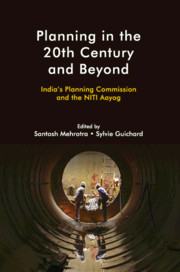Book contents
- Frontmatter
- Contents
- List of Figures
- List of Tables
- List of Abbreviations
- 1 Planning for a 21st Century India
- Part I Origins: Ideas and Ideology
- 2 From Economists to Historians: Studying the Planning Commission, 1950–2014
- 3 The Long Road to Indian Economic Planning (until 1950)
- 4 Ideas and Origins of the Planning Commission in India
- Part II Changes and Continuity: Development and Adaptation of Planning and the Planning Commission
- 5 The Planning Commission and Education
- 6 Addressing Agrarian Distress: Sops versus Development
- 7 Economic Planning after Economic Liberalization: Between Planning Commission and Think Tank NITI, 1991–2015
- 8 Planning Commission: Obiter Dictum
- 9 On a Revived Planning Commission
- Part III Planning Beyond the Planning Commission
- 10 Make in India
- 11 Manufacturing: The Cornerstone of a Planning Strategy for the 21st Century
- 12 Fiscal Planning to Sustain Growth and Poverty Reduction
- 13 Plan, but Do Not Over-plan: Lessons for NITI Aayog
- 14 Why Does India Need a Central Planning Institution in the 21st Century?
- Notes on Contributors
- Index
- References
8 - Planning Commission: Obiter Dictum
Published online by Cambridge University Press: 04 April 2020
- Frontmatter
- Contents
- List of Figures
- List of Tables
- List of Abbreviations
- 1 Planning for a 21st Century India
- Part I Origins: Ideas and Ideology
- 2 From Economists to Historians: Studying the Planning Commission, 1950–2014
- 3 The Long Road to Indian Economic Planning (until 1950)
- 4 Ideas and Origins of the Planning Commission in India
- Part II Changes and Continuity: Development and Adaptation of Planning and the Planning Commission
- 5 The Planning Commission and Education
- 6 Addressing Agrarian Distress: Sops versus Development
- 7 Economic Planning after Economic Liberalization: Between Planning Commission and Think Tank NITI, 1991–2015
- 8 Planning Commission: Obiter Dictum
- 9 On a Revived Planning Commission
- Part III Planning Beyond the Planning Commission
- 10 Make in India
- 11 Manufacturing: The Cornerstone of a Planning Strategy for the 21st Century
- 12 Fiscal Planning to Sustain Growth and Poverty Reduction
- 13 Plan, but Do Not Over-plan: Lessons for NITI Aayog
- 14 Why Does India Need a Central Planning Institution in the 21st Century?
- Notes on Contributors
- Index
- References
Summary
Introduction
While the death knell had been tolling for the 64-year-old Planning Commission well before the resounding electoral victory of the current government, the administration of extreme unction had to await the prime minister's Independence Day address to the nation from the ramparts of the Red Fort. In the wake of the historic announcement, the jubilant cries of triumph of corporate India, reminded one of the Biblical blasts of Joshua's trumpets at the crashing walls of Jericho.
In the popular imagination, national planning is strongly associated with the names of Jawaharlal Nehru and P.C. Mahalanobis, with a strong connotation of Soviet-style centralization. However, from a historical perspective, the idea of planning (in India) has strong indigenous elements and seems to go back to the 19th-century writings of nationalists like Dadabhai Naoroji, R. C. Dutt, and Mahadeo Govind Ranade, with their emphasis on the importance of state-led industrialization for the removal of national poverty. They strongly felt that private initiative would not suffice to provide a stimulus of the required magnitude and stressed the promotional role of the state not only in the mobilization of savings and finance, but also in the development of banking and in promoting higher education. Socialist ideas started creeping into Congress party circles in the wake of the Russian revolution. At the 1931 Karachi session of the Indian National Congress, a ‘socialist pattern of development’ was set as the goal for India. The young Congress leadership of Nehru and Netaji Subhas Chandra Bose were deeply committed to this idea. After being elected the president of the Indian National Congress at its Haripura session in 1938, Bose constituted the Planning Committee on 17 December 1938 and invited Nehru to chair this committee.
As leader of independent India, with a clean slate to chart out its economic future and with the vision of making India prosperous, internally stable, and externally (militarily) secure, to Nehru the Soviet's high growth phase of 1928–1952 seemed a far more attractive alternative than the much slower (and deeper) Industrial Revolution of western Europe. Thus, undeniably, the inception of planning in India in the 1950s was inspired and influenced by the Soviet central planning experiment. But while this was the major influence, it was not the only one.
- Type
- Chapter
- Information
- Planning in the 20th Century and BeyondIndia's Planning Commission and the NITI Aayog, pp. 152 - 166Publisher: Cambridge University PressPrint publication year: 2020



